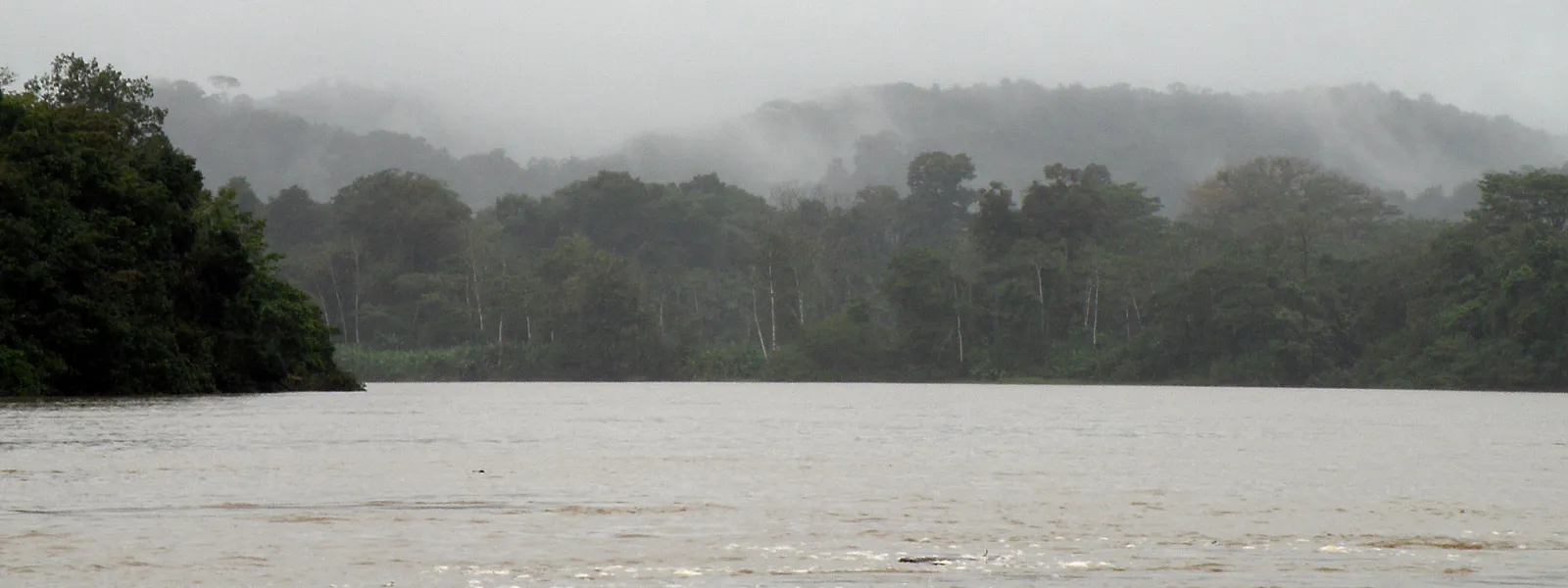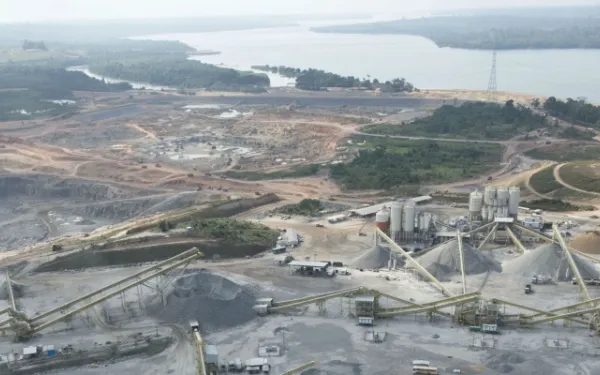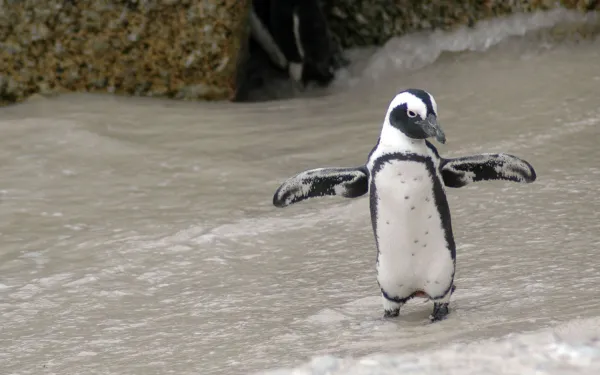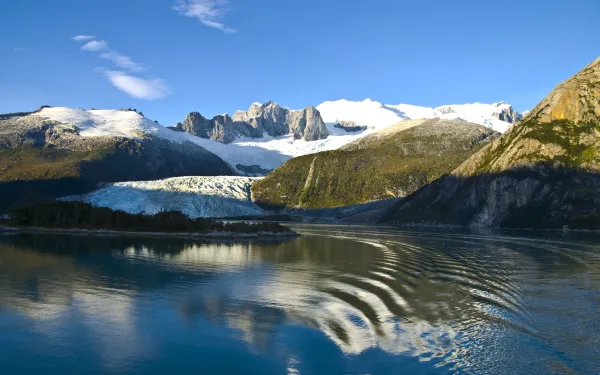
Project
Photo: Thomas Jundt / CC BY-NCVictory: Crucitas gold mine cancelled for environmental harm
In Costa Rica, for the first time, a high-level court cancelled a large-scale mining project for the first time because it violated national laws and threatened the health of the environment. AIDA played an important role in establishing this precedent.
The company, Industrias Infinito, with the support of the previous government, planned to construct an open-pit gold mine in an incredibly biodiverse area near San Juan River, which forms the country’s border with Nicaragua.
The construction and operation of the mine threatened not just the environment but the cultural survival of 32 communities whose way of life depends on tourism and sport fishing in the area.
The fight to stop Crucitas began in 2008 when AIDA warned the Costa Rican government about potential international law violations and environmental impacts that had to be considered before allowing for the project’s implementation. We recommended suspending all work on the project until legal compliance and the protection of the environment and human health were guaranteed.
In November 2010, the Costa Rican Contentious Administrative Court cancelled the project’s concession, reiterating the importance of complying with legal standards when approving projects.
Though the company appealed the ruling, an appeals court later rejected their request and the Crucitas gold mine was cancelled for good.
We congratulate the national NGOs who worked on this case, especially the Environmental and Natural Resources Law Center (CEDARENA), for their tireless efforts in defense of the environment and human rights.
It is our hope that the precedent established in the case will be replicated in nations across Latin America.
Partners:
Related projects

Brazil and the example that should be followed
In an apparent turnaround, the Brazilian government has signaled an end to the construction of large dams in the Amazon. If materialized, it will be a step worthy of imitation. Then the region, and the world, can move towards truly sustainable energy generation that respects the environment and human rights. 2018 began with encouraging news for the energy sector, and for rivers and human rights in Latin America. A senior official with the Brazilian government signaled, in an interview with the newspaper O Globo, the beginning of the end of large dams in the Amazon nation. That statement is backed up by the notable absence of several of these projects in Brazil’s new Ten-Year Plan for Energy Expansion. The about-face is particularly significant since Brazil is a world leader in the construction of large hydroelectric projects, which until a few months ago were relied on to meet the nation’s rising energy demands. Between corruption and lack of financing The decision is a response to various factors, including the social conflicts and environmental impacts that large dams have caused in the Amazon, and major opposition from indigenous communities and civil society organizations. In addition, these projects have involved high costs from the start and, as Edvaldo Santana, former director of the National Electric Energy Agency (ANEEL) told O Globo, they “end up costing much more, despite the licenses.” Large dams have also been at the center of the largest corruption scandal in the history of Brazil, uncovered by the Lava Jato investigation, which went beyond borders to involve politicians and businessmen from 11 Latin American nations. The evidence gathered then prompted the initiation of Leviathan, a special investigation into the Belo Monte Dam due to the signs of high payments of bribes related to its construction. All of the above is in addition to the requirements for environment licenses with which several projects have failed to comply. This is the case of Belo Monte, whose license has been suspended for months, and of the Tapajós Dam, who license was denied last year. On the other hand, the Brazilian government announced the privatization of Electrobras, a public company with a fundamental role in the construction of these large infrastructure projects. With this and the economic crisis that has affected the ability of the Brazilian National Bank for Economic Development (BNDES) to support these mega-projects, the large dams have lost their primary sources of funding. Therefore—and in the face of technological advances and clean energy alternatives—Brazil is beginning to leave behind large dams and take and important step towards truly sustainable energy, and development that respects human rights. This advance could have an important impact on the entire American continent. It could begin a wave of change toward a more modern energy matrix, further removed from the increasingly obsolete large dams. A necessary change In the Amazon basin alone, more than 275 new large dams are planned, the majority in the Andean region. And hundreds more are lined up in Central America and Mexico. To echo Brazil’s announcement, these initiatives could incorporate adequate and comprehensive energy planning with serious cost and risk assessments. In these terms, Pablo Pedrosa, Executive Secretary of Brazil’s Ministry of Mines and Energy, told O Globo, “We are not willing to make moves to disguise the costs and the risks.” Even global entities such as the International Finance Corporation (IFC), part of the World Bank Group, have experienced first-hand the financial, reputational and socio-environmental costs of inadequately evaluating large dam projects. In 2012, the IFC, through the Latin American Fund for Renewable Infrastructure, provided $15 million USD to fund the Santa Rita Dam, which was to be built on the Ictobay River in Alta Verapaz, Guatemala. At the end of last year, the entity’s accountability mechanism concluded that the investment had breached the IFC’s operational policies. The project had failed to comply with the affected community’s right to free, prior and informed consent. Although IFC management denied the findings of its accountability mechanism, the project has been suspended since 2013 and the indigenous communities of the area maintain their opposition to it. Brazil’s recent decision reinforces the global trend of moving away from large dams. Over the last several years in the United States, large dams have been removed to rescue rivers and the benefits they provide, like wild salmon runs on the Snake River in Washington State. Given this good start to the year, it will be essential to ensure the effective implementation of Brazil’s decision. And, following that example, perhaps other Andean-Amazonian countries will also move towards modernity, consider the real costs of large dams, and begin to promote better, cheaper energy alternatives that don’t sacrifice natural ecosystems and the communities that depend on them.
Read more
Salmon farms in Chilean Patagonia approved without adequate environmental evaluation
A study commissioned by the Interamerican Association for Environmental Defense found that more than half of the salmon farms currently operating in the Magallanes region of Southern Patagonia have generated a partial or total lack of oxygen in the water. Nine of those are located in naturally protected areas. Santiago, Chile. A recent study, commissioned by the Interamerican Association for Environmental Defense (AIDA), concluded that salmon farms located in the Magallanes region of southern Patagonia were authorized without the scientific assessments needed to ensure they would do no harm to marine life. “After twenty years of development in other regions, the salmon industry now seeks to expand to the country’s last virgin coasts, without the necessary precautions,” explained Gladys Martínez, senior attorney of AIDA’s Marine Program. “This study demonstrates that neither the companies nor that State have done enough to avoid in Magallanes the severe environmental damage already perpetuated in other regions of the country.” Chilean biologist Héctor Kol produced the report for AIDA, with the support of the Waitt Foundation, analyzing 261 salmon farm projects. Of them, a little less than half have already been authorized and the rest could receive their permits in the short- and medium-term. Of the 126 authorized projects, only 35 are currently in operation. The information produced on each project includes location maps and estimations of the amount of waste being discharged into the waters. The research shows that there are large differences in the quantity of waste that the government authorized for different subsectors of the same geographic areas, without any available explanation as to why. “This demonstrates a clear lack of scientific evaluation, necessary to guarantee the aquatic environment will be able to receive and process the authorized quantity of waste,” said Florencia Ortúzar, AIDA attorney. “More than half of the projects that are currently in operation have already generated a total or partial lack of oxygen in the waters, which seriously impacts marine life. In addition, at least nine of these oxygen-depriving projects are located in natural protected areas.” On May 22, 2017, AIDA filed a complaint before the Superintendency of the Environment requesting the investigation of damages caused by salmon farms in Magallanes, and the sanctioning of the companies responsible. Consult the report here. Interactive Map of Salmon Farms here. More information on salmon farms in Patagonia is available here. Press contact: Florencia Ortúzar, AIDA attorney, +56973353135, [email protected]
Read more
The Risks of the Salmon Industry’s Expansion in Chilean Patagonia
In Chile, the salmon industry has grown rapidly over the last 20 years, often at the expense of the environment, as has been made evident in the regions of Los Lagos and Aysén, where salmon farms have been firmly established. In search of more pristine waters, the industry is now settling into the country’s last virgin coasts, in the region of Magallanes, in Southern Patagonia. The expansion is taking place without scientific evidence or serious studies to establish the limits of production in terms of water capacity. This could have catastrophic consequences for local ecosystems, a fact that has sparked concern among environmental organizations. The purpose of this report, written for AIDA by the biologist Héctor Kol, with the support of the Waitt Foundation, is to contribute to the understanding of the current and potential damages that the industrial production of salmon implies for Magallanes. With this, it also seeks to contribute to the effective protection of the aquatic-marine environment of Patagonia, through the use of existing legal tools. The document presents a detailed analysis of the situation of salmon farms in Magallanes, responding to the following questions: How many exist? Where are they? How much do they produce and in what conditions do they do so? The study includes the farms already authorized by the government and those whose permits are in process. These were divided by geographical sectors to facilitate the analysis. The information on each project includes a location map and estimates of the amount of waste left in the waters, a key aspect to determining their impact on marine life. In this way, the author illustrates the magnitude of the problem. The report also contains basic information on the authorization process for this type of project and on the regulations that exist for the sector, as well as an annex with scientific and legal documents related to each project. The analysis leads to several important conclusions, including the following: Of the 261 projects analyzed, a little less than half have been authorized and the rest could receive their authorizations in the short- and medium- term. This demonstrates the rapid growth of the industry in the region and alerts to the need for constant monitoring, above all of the environmental and sanitary conditions in which they operate. Of the authorized projects only 35 (equivalent to 25 percent of the total) are effectively in operation. There exist, in a same geographic sector and without explanation, large differences in the production and quantity of waste that the government has authorized for different subsectors. This demonstrates the lack of a scientific evaluation that would guarantee the water’s capacity to safely receive the authorized amounts of waste. More than half of the projects currently in operation have generated a total or partial lack of oxygen in the water, which gravely affects marine life. Even more serious is that at least nine of them are located in protected natural areas. This demonstrates that, before operating permits were authorized, adequate studies were not conducted to ensure that the capacity of the waters would not be exceeded by the quantity of fish authorized for breeding. It also means that projects are not subject to appropriate environmental impact assessments. There is not environmental information available for all the authorized projects, which makes it impossible to determine with greater precision the potential damages that the salmon industry could cause in Magallanes. In short, the study concludes that neither the State nor the salmon companies have done enough to prevent the damages already caused by the industry in other regions of Chile, which may now be repeated in one of the country’s most pristine natural areas. Consult and download the complete report (in Spanish) MAP - Salmon farms by geographic area Red icons and polygons: projects with authorized aquaculture concession, approved Technical Project and available environmental assessment (104 in total). White icons and red polygons: projects with authorized aquaculture concession and approved Technical Project, but without RCA or environmental information available (22 in total). Yellow icons and polygons: pending projects, without approved aquaculture concession, but with approved Technical Project (10 in total). Icons and green polygons: pending projects, without approved aquaculture concession and without approved Technical Project, but considered viable by the SUBPESCA (124 in total). View larger map
Read more